大学英语4翻译课文及课后答案,期末考试复习题完形填空15选10翻译十五选十选词填空大学英语4课文5
大学英语第四册翻译答案
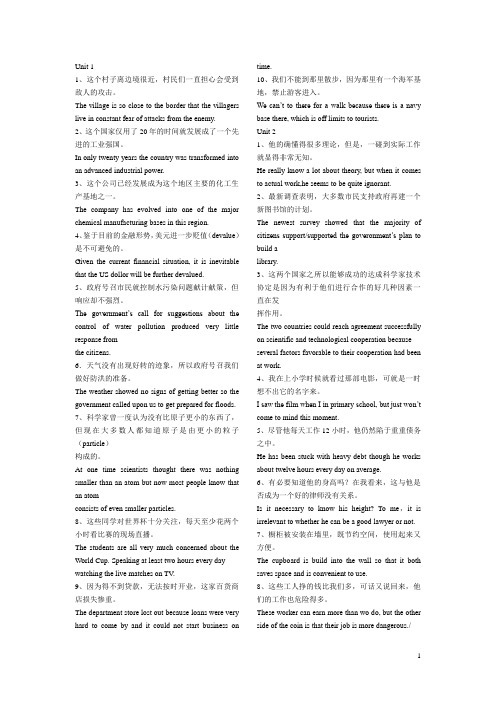
Unit 11、这个村子离边境很近,村民们一直担心会受到敌人的攻击。
The village is so close to the border that the villagers live in constant fear of attacks from the enemy.2、这个国家仅用了20年的时间就发展成了一个先进的工业强国。
In only twenty years the country was transformed into an advanced industrial power.3、这个公司已经发展成为这个地区主要的化工生产基地之一。
The company has evolved into one of the major chemical manufacturing bases in this region.4、鉴于目前的金融形势,美元进一步贬值(devalue)是不可避免的。
Given the current financial situation, it is inevitable that the US dollor will be further devalued.5、政府号召市民就控制水污染问题献计献策,但响应却不强烈。
The government’s call for suggestions about the control of water pollution produced very little response fromthe citizens.6.天气没有出现好转的迹象,所以政府号召我们做好防洪的准备。
The weather showed no signs of getting better so the government called upon us to get prepared for floods.7、科学家曾一度认为没有比原子更小的东西了,但现在大多数人都知道原子是由更小的粒子(particle)构成的。
21世纪大学英语4课后翻译+十五选十
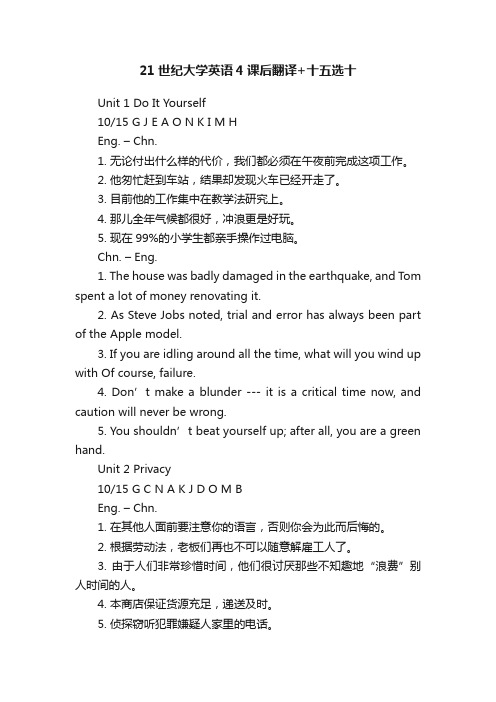
21世纪大学英语4课后翻译+十五选十Unit 1 Do It Yourself10/15 G J E A O N K I M HEng. – Chn.1. 无论付出什么样的代价,我们都必须在午夜前完成这项工作。
2. 他匆忙赶到车站,结果却发现火车已经开走了。
3. 目前他的工作集中在教学法研究上。
4. 那儿全年气候都很好,冲浪更是好玩。
5. 现在99%的小学生都亲手操作过电脑。
Chn. – Eng.1. The house was badly damaged in the earthquake, and Tom spent a lot of money renovating it.2. As Steve Jobs noted, trial and error has always been part of the Apple model.3. If you are idling around all the time, what will you wind up with Of course, failure.4. Don’t make a blunder --- it is a critical time now, and caution will never be wrong.5. You shouldn’t beat yourself up; after all, you are a green hand.Unit 2 Privacy10/15 G C N A K J D O M BEng. – Chn.1. 在其他人面前要注意你的语言,否则你会为此而后悔的。
2. 根据劳动法,老板们再也不可以随意解雇工人了。
3. 由于人们非常珍惜时间,他们很讨厌那些不知趣地“浪费”别人时间的人。
4. 本商店保证货源充足,递送及时。
5. 侦探窃听犯罪嫌疑人家里的电话。
Chn. – Eng.1. The government is striving for improvements in public housing.2. The five rings are thought to symbolize the five continents: Europe, Asia, Africa, Oceania and America.3. His father smiled weakly in an attempt to reassure him that everything was all right.4. His silence is in effect a refusal.5. I begin to probe and try to find out why they have dismissed her.Unit 3 Marriage10/15 C F H A L N G J K EEng. – Chn.1. 这块桌布不耐脏。
新视野大学英语4 十五选十原文加翻译
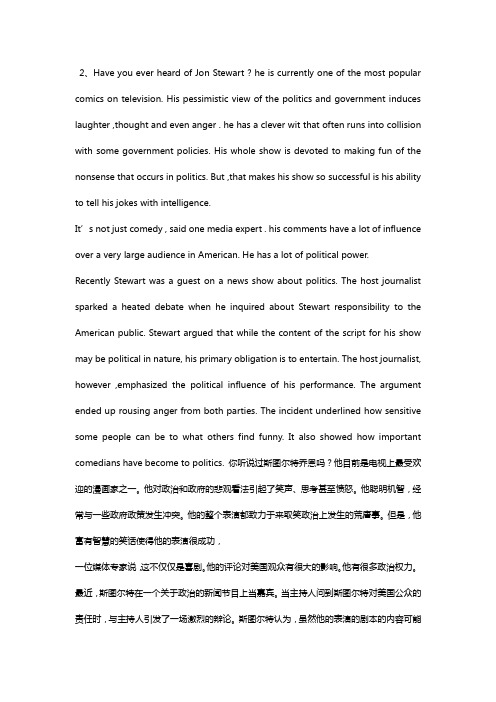
2、Have you ever heard of Jon Stewart ? he is currently one of the most popular comics on television. His pessimistic view of the politics and government induces laughter ,thought and even anger . he has a clever wit that often runs into collision with some government policies. His whole show is devoted to making fun of the nonsense that occurs in politics. But ,that makes his show so successful is his ability to tell his jokes with intelligence.It’s not just comedy , said one media expert . his comments have a lot of influence over a very large audience in American. He has a lot of political power.Recently Stewart was a guest on a news show about politics. The host journalist sparked a heated debate when he inquired about Stewart responsibility to the American public. Stewart argued that while the content of the script for his show may be political in nature, his primary obligation is to entertain. The host journalist, however ,emphasized the political influence of his performance. The argument ended up rousing anger from both parties. The incident underlined how sensitive some people can be to what others find funny. It also showed how important comedians have become to politics.你听说过斯图尔特乔恩吗?他目前是电视上最受欢迎的漫画家之一。
全新版大学英语综合教程第四册课文翻译及习题答案(上海外语教育出版
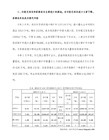
Chinese Translations of Texts A(Units 1-8)参考译文第一单元与自然力量抗争课文A????人道是骄兵必败。
就拿拿破仑和希特勒两人来说吧,他们所向披靡,便以为自己战无不胜,不可阻挡。
但俄罗斯的冰雪卫士证明他们错了。
冰雪卫士奈拉·B·斯密斯????1812年,法国皇帝拿破仑·波拿巴率大军入侵俄罗斯。
他准备好俄罗斯人民会为保卫祖国而奋勇抵抗。
他准备好在俄罗斯广袤的国土上要经过长途跋涉才能进军首都莫斯科。
但他没有料到在莫斯科他会遭遇劲敌——俄罗斯阴冷凄苦的寒冬。
1941年,纳粹德国元首阿道夫·希特勒进攻当时被称作苏联的俄罗斯。
希特勒的军事实力堪称无敌。
他的战争机器扫除了欧洲绝大部分地区的抵抗。
希特勒希望速战速决,但是,就像在他之前的拿破仑一样,他得到的是痛苦的教训。
仍是俄罗斯的冬天助了苏维埃士兵一臂之力。
拿破仑发起的战役????1812年春,拿破仑在俄国边境屯兵60万。
这些士兵受过良好训练,作战力强,装备精良。
这支军队被称为大军。
拿破仑对马到成功充满自信,预言要在5个星期内攻下俄国。
????不久,拿破仑的大军渡过涅曼河进入俄国。
拿破仑期盼着的速决速胜迟迟没有发生。
令他吃惊的是,俄国人并不奋起抵抗。
相反,他们一路东撤,沿途焚毁庄稼和民居。
大军紧追不舍,但它的长驱直入很快由于粮草运输缓慢而停顿下来。
????到了8月,法俄两军在斯摩棱斯克交战,这一战役中,双方各有上万人阵亡。
可是,俄国人仍能在自己的国土上继续后撒。
拿破仑未能取得决定性的胜利。
此刻他面临着一个重要抉择。
是继续追击俄国,军队,还是把军队驻扎在斯摩棱斯克,在那儿度过将到的冬天? ????拿破仑孤注一掷,决定向远在448公里之外的莫斯科进发。
1812年9月7日,法俄两军在莫斯科以西112公里外的鲍罗季诺激战。
夜幕降临时,3万名法国士兵以及4万4千名俄国士兵或伤或亡,倒在了战场上。
新视野大学英语第四册【英语15选10翻译】下
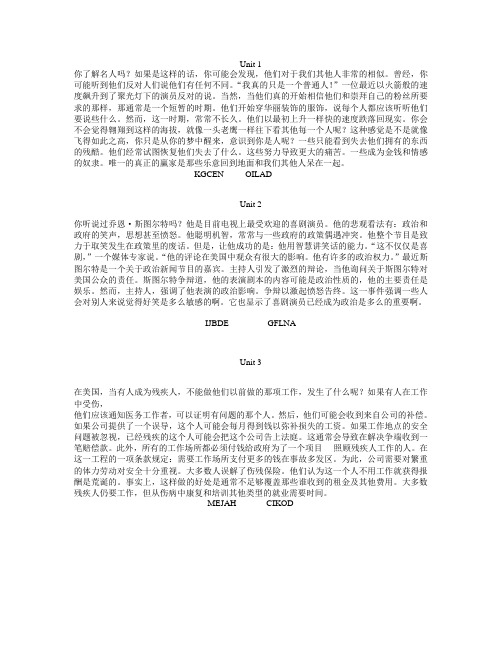
Unit 1你了解名人吗?如果是这样的话,你可能会发现,他们对于我们其他人非常的相似。
曾经,你可能听到他们反对人们说他们有任何不同。
“我真的只是一个普通人!”一位最近以火箭般的速度飙升到了聚光灯下的演员反对的说。
当然,当他们真的开始相信他们和崇拜自己的粉丝所要求的那样,那通常是一个短暂的时期。
他们开始穿华丽装饰的服饰,说每个人都应该听听他们要说些什么。
然而,这一时期,常常不长久。
他们以最初上升一样快的速度跌落回现实。
你会不会觉得翱翔到这样的海拔,就像一头老鹰一样往下看其他每一个人呢?这种感觉是不是就像飞得如此之高,你只是从你的梦中醒来,意识到你是人呢?一些只能看到失去他们拥有的东西的残酷。
他们经常试图恢复他们失去了什么。
这些努力导致更大的痛苦。
一些成为金钱和情感的奴隶。
唯一的真正的赢家是那些乐意回到地面和我们其他人呆在一起。
KGCEN OILADUnit 2你听说过乔恩·斯图尔特吗?他是目前电视上最受欢迎的喜剧演员。
他的悲观看法有:政治和政府的笑声,思想甚至愤怒。
他聪明机智,常常与一些政府的政策偶遇冲突。
他整个节目是致力于取笑发生在政策里的废话。
但是,让他成功的是:他用智慧讲笑话的能力。
“这不仅仅是喜剧,”一个媒体专家说。
“他的评论在美国中观众有很大的影响。
他有许多的政治权力。
”最近斯图尔特是一个关于政治新闻节目的嘉宾。
主持人引发了激烈的辩论,当他询问关于斯图尔特对美国公众的责任。
斯图尔特争辩道,他的表演剧本的内容可能是政治性质的,他的主要责任是娱乐。
然而,主持人,强调了他表演的政治影响。
争辩以激起愤怒告终。
这一事件强调一些人会对别人来说觉得好笑是多么敏感的啊。
它也显示了喜剧演员已经成为政治是多么的重要啊。
IJBDE GFLNAUnit 3在美国,当有人成为残疾人,不能做他们以前做的那项工作,发生了什么呢?如果有人在工作中受伤,他们应该通知医务工作者,可以证明有问题的那个人。
然后,他们可能会收到来自公司的补偿。
大学英语4翻译课文及课后答案,期末考试复习题完形填空15选10翻译十五选十选词填空Unit 10

Unit 10TextDo you view work as a burden or an opportunity? Are you the kind of person who looks for ways to save your energy or the kind that finds spending your energy satisfying? Why do people like to complain about work? Find the answers to question like these in the following essay.WHY PEOPLE WORKLeonard R. SaylesJobs and work do much more than most of us realize to provide happiness and contentment. We're all used to thinking that work provides the material things of life -- the goods and services that make possible our modern civilization. But we are much less conscious of the extent to which work provides the more intangible, but more crucial, psychological well-being that can make the difference between a full and an empty life.Historically, work has been associated with slavery and sin and punishment. And in our own day we are used to hearing the traditional complaints: "I can't wait for my vacation," "I wish I could stay home today," "My boss treats me poorly," "I've got too much work to do and not enough time to do it." Against this background, it may well come as a surprise to learn that not only psychologists but other behavioral scientists have come to accept the positive contribution of work to the individual's happiness and sense of personal achievement. Work is more than a necessity for most human beings; it is the focus of their lives, the source of their identity and creativity.Rather than a punishment or a burden, work is the opportunity to realize one's potential. Many psychiatrists heading mental health clinics have observed its healing effect. A good many patients who feel depressed in clinics gain renewed self-confidence when gainfully employed and lose some, if not all, of their most acute symptoms. Increasingly, institutions dealing with mental health problems are establishing workshops wherein those too sick to get a job in "outside" industry can work, while every effort is exerted to arrange "real" jobs for those well enough to work outside.And the reverse is true, too. For large numbers of people, the absence of work is harmful to their health. Retirement often brings many problems surrounding the "What do I do with myself?" question, even though there may be no financial cares. Large numbers of people regularly get headaches and other illnesses on weekends when they don't have their jobs to go to, and must fend for themselves. It has been observed that unemployment, quite aside from exerting financial pressures, brings enormous psychological troubles and that many individuals deteriorate rapidly when jobless.But why? Why should work be such a significant source of human satisfaction? A good share of the answer rests in the kind of pride that is stimulated by the job, by the activity of accomplishing.Pride in AccomplishmentThe human being longs for a sense of being accomplished, of being able to do things, with his hand, with his mind, with his will. Each of us wants to feel he or she has the ability to do something that is meaningful and that serves as a tribute to our inherent abilities.It is easiest to see this in the craftsman who lovingly shapes some cheap material into an object that may be either useful or beautiful or both. You can see the carpenter or bricklayer stand aside and admire the product of his personal skill.But even where there is no obvious end product that is solely attributable to one person's skill, researchers have found that employees find pride in accomplishment. Our own research in hospitals suggests that even the houskeeping and laundry staffs take pride in the fact that in their own ways they are helping to cure sick people -- and thus accomplishing good deal.We're often misled by the complaints surrounding difficult work; deep down most people regard their won capacity to conquer the tough job as the mark of their own unique personality. Complaining is just part of working. After all, how else do you know who you are, except as you can demonstrate the ability of your mind to control you limbs ad hands and words? You are, in significant measure, what you can do.Some are deceived into thinking that people like to store up energy, to rest and save themselves as much as possible. Just the opposite. It is energy expenditure that is satisfying. Just watch an employee who must deal with countless other people because his or her job is at some central point in a communications network: a salesman at a busy counter, a stock broker on the phone, a customer representative. They will tell you how much skill and experience it takes to answer countless questions and handle various kinds of personalities every hour of the day. Not everyone can interact with such persistence and over long hours, but those who do, pride themselves on a distinctive ability that contributes mightily to the running of the organization.But work is more than accomplishment and pride in being able to command the job, because except for a few craftsmen and artists most work takes place "out in the world," with an through other people.Esprit de corpsPerhasps an example will make the point:I remember viewing a half dozen me in a chair factory whose job it was to bend several pieces of steel and attach them so that a folding chair would result. While there were ten or twelve of these "teams" that worked together, one in particular was known for its perfect coordination and lightning-like efforts. The men knew they were good. They would work spurts for twenty or thirty minutes before taking a break -- to show themselves, bystanders and other groups what it was to be superbly skilled and self-controlled, to be the best in the factory.When I talked with them, each expressed enormous pride in being a part of the fastest, best team. And this sense of belonging to an accomplished work group is one of the distinctive satisfactions of the world of work.One further word about work group satisfactions. Unlike many other aspects of life, relationships among people at work tend to be simpler, less complicated, somewhat less emotional. This is not to say there aren't arguments and jealousies, but, on the whole, behavioral research discloses that human relations at work are just easier, perhaps because they are more regular and predictable and thus simpler to adjust to than the sporadic, the more intense and less regular relationships in the community. And the work group also gently pressures its members to learn how to adjust to one another so that the "rough edges" are worked off because people know they must do certain things with and through one another each day.Beyond the team and the work group, there is the organization, whether it be company or hospital or university. The same pride in being part of a well-coordinated, successful unit is derived from being part of a larger collectivity. Working for a company that is thought of as being part of the best in the community can provide employees with both status and self-confidence.They assume, usually with good reason, that others regard them more highly, even envy them, and that they are more competent than the average because of this association with a "winner," a prestigious institution. We in truth bask in the reflected glory of the institution, and we seek ways of asserting our membership so that others will know and can recognize our good fortune. New Words。
大学期末英语考试大学英语4综合教程unit15课后段落翻译

Unit 1攻势已经持续了三天,但是我们并没有取得多少进展。
我们在前线与敌人交战的部队遇到了强力的抵抗。
师长(DIVISION COMMANDER)命令我们营(BATTALION)绕到敌人后方发起突然袭击。
然而,要绕到敌人后方,我们必须越过一片沼泽地(MARSHLAND)。
我们很多人担心会陷入泥潭之中。
我们营长决定冒一下险。
我们在夜幕掩盖下出发,不顾困难,奋勇向前。
幸运的是,夜间温度突然下降到摄氏零下20度,烂泥地都结上了冰。
由于这寒冷的天气,我们于天亮前到达并从敌人后方发起进攻。
这一下扭转了战局。
敌人没有戒备,不久便投降了。
The offensive had already lasted three days,but we had not gained much ground.Our troops engaging the enemy at the front were faced with strong/fierce/stiff resistance.T he division commander instructed our battalion to get around to the rear of the enem y and launch a surprise attack.To do so,we had to cross marshland and many of us we re afraid we might get bogged down in the mud.Our battalion commander decided t o take a gamble.We started under cover of darkness and pressed on in spite of great difficulties.By a stroke of luck,the temperature at night suddenly dropped to minus 20 degrees Celsius and the marsh froze over.Thanks to the cold weather,we arrived at ou r destination before dawn and began attacking the enemy from the rear.This turned t he tide of the battle.The enemy,caught off guard,soon surrendered.Unit 2汽车在二十世纪改变了世界,尤其是在美国和其他工业国家。
大学英语四级考试15选10专项训练答案(包含大学英语四级考试仔细阅读专项训练答案)
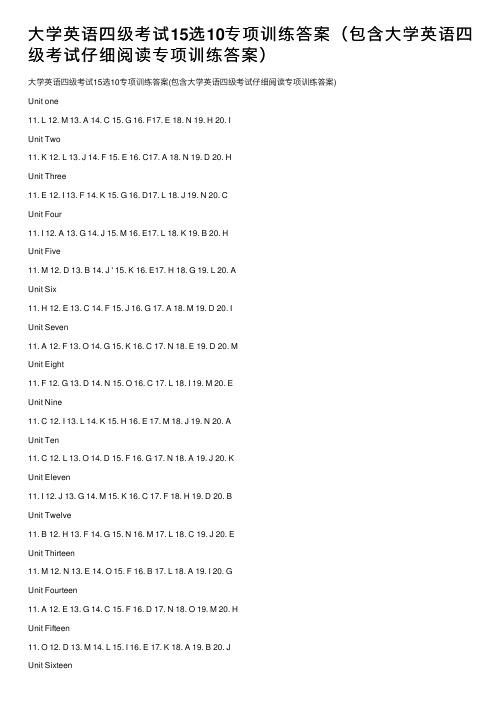
⼤学英语四级考试15选10专项训练答案(包含⼤学英语四级考试仔细阅读专项训练答案)⼤学英语四级考试15选10专项训练答案(包含⼤学英语四级考试仔细阅读专项训练答案)Unit one11. L 12. M 13. A 14. C 15. G 16. F17. E 18. N 19. H 20. IUnit Two11. K 12. L 13. J 14. F 15. E 16. C17. A 18. N 19. D 20. HUnit Three11. E 12. I 13. F 14. K 15. G 16. D17. L 18. J 19. N 20. CUnit Four11. I 12. A 13. G 14. J 15. M 16. E17. L 18. K 19. B 20. HUnit Five11. M 12. D 13. B 14. J ' 15. K 16. E17. H 18. G 19. L 20. AUnit Six11. H 12. E 13. C 14. F 15. J 16. G 17. A 18. M 19. D 20. IUnit Seven11. A 12. F 13. O 14. G 15. K 16. C 17. N 18. E 19. D 20. MUnit Eight11. F 12. G 13. D 14. N 15. O 16. C 17. L 18. I 19. M 20. EUnit Nine11. C 12. I 13. L 14. K 15. H 16. E 17. M 18. J 19. N 20. AUnit Ten11. C 12. L 13. O 14. D 15. F 16. G 17. N 18. A 19. J 20. KUnit Eleven11. I 12. J 13. G 14. M 15. K 16. C 17. F 18. H 19. D 20. BUnit Twelve11. B 12. H 13. F 14. G 15. N 16. M 17. L 18. C 19. J 20. EUnit Thirteen11. M 12. N 13. E 14. O 15. F 16. B 17. L 18. A 19. I 20. GUnit Fourteen11. A 12. E 13. G 14. C 15. F 16. D 17. N 18. O 19. M 20. HUnit Fifteen11. O 12. D 13. M 14. L 15. I 16. E 17. K 18. A 19. B 20. JUnit Sixteen11. F 12. O 13. E 14. C 15. K 16. A 17. H 18. N 19. B 20. DUnit Seventeen11. C 12. E 13. I 14. L 15. H 16. D 17. G 18. A 19. O 20. FUnit Eighteen11. L 12. E 13. J 14. M 15. I 16. N 17. C 18. D 19. A 20. FUnit Nineteen11. H 12. D 13. O 14. E 15. B 16. N 17. M 18. L 19. G 20. AUnit Twenty11. E 12. F 13. J 14. C 15. I 16. M 17. G 18. A 19. L 20. D Unit Twenty-One 11. F 12. C 13. G 14. M 15. B 16. H 17. N 18. L 19. O 20. AUnit Twenty-Two11. N 12. A 13. M 14. G 15. O 16. J 17. D 18. C 19. F 20. LUnit Twenty-Three11. I 12. B 13. C 14. D 15. O 16. K 17. N 18. F 19. A 20. EUnit Twenty-Four11. O 12. F 13. H 14. E 15. I 16. A 17. N 18. J 19. D 20. CUnit Twenty-Five11. B 12. L 13. I 14. C 15. J 16. E 17. O 18. H 19. A 20. NUnit Twenty-Six11. D 12. F 13. I 14. G 15. A 16. C 17. L 18. M 19. JUnit Twenty-Seven11. C 12. G 13. D 14. H 15. I 16. N 17. M 18. J 19. F 20. AUnit Twenty-Eight11. B 12. J 13. A 14. H 15. C 16. I 17. M 18. E 19. D 20. KUnit Twenty-Nine11. C 12. H 13. D 14. E 15. M 16. A 17. N 18. F 19. G 20. LUnit Thirty11. E 12. D 13. N 14. J 15. B 16. F 17. L 18. M 19. O 20. AUnit Thirty-One11. I 12. B 13. J 14. C 15. G 16. H 17. E 18. K 19. M 20. AUnit Thirty-Two11. A 12. E 13. G 14. M 15. L 16. F 17. C 18. H 19. N 20. DUnit Thirty-Three11. A 12. F 13. B 14. D 15. L 16. E 17. O 18. K 19. G 20. MUnit Thirty-Four11. D 12. F 13. C 14. N 15. A 16. B 17. G 18. E 19. O 20. M Unit Thirty-Five11. D 12. F 13. H 14. K 15. M 16. J 17. G 18. B 19. C 20. N Unit Thirty-Six11. D 12. E 13. I 14. C 15. K 16. H 17. O 18. J 19. F 20. B Unit Thirty-Seven11. I 12. B 13. E 14. A 15. M 16. G 17. L 18. D 19. J 20. C Unit Thirty-Eight11. H 12. I 13. B 14. D 15. J 16. K 17. F 18. C 19. G 20. L Unit Thirty-Nine11. B 12. C 13. E 14. J 15. G 16. F 17. K 18. O 19. D 20. H Unit Forty11. B 12. K 13. I 14. L 15. J 16. F 17. G 18. M 19. E 20. H Unit Forty-One11. B 12. F 13. E 14. H 15. A 16. M 17. N 18. J 19. G 20. O Unit Forty-Two11. D 12. A 13. B 14. E 15. K 16. N 17. M 18. C 19. J 20. L Unit Forty-Three11. O 12. I 13. B 14. H 15. G 16. C 17. L 18. J 19. N 20. A Unit Forty-Four11. D 12. F 13. L 14. J 15. G 16. I 17. H 18. C 19. M 20. B Unit Forty-Five11. D 12. E 13. K 14. H 15. F 16. L 17. O 18. I 19. J 20. C Unit Forty-Six11. D 12. H 13. M 14. F 15. I 16. K 17. N 18. A 19. J 20. C Unit Forty-Seven11. L 12. D 13. C 14. F 15. I 16. E 17. J 18. K 19. B 20. N Unit Forty-Eight11. B 12. L 13. F 14. G 15. K 16. E 17. M 18. O 19. I 20. C Unit Forty-Nine11. F 12. L 13. I 14. B 15. C 16. K 17. E 18. H 19. D 20. J Unit Fifty11. F 12. E 13. A 14. K 15. O 16. J 17. I 18. H 19. L 20. B 快速阅读练习答案skimming and scanning passage 11-7 BCACDCB8.overall white woman9.the beauty industry's standards10.the beauty desirabilityPassage2 DBADCAC10. 8. 【解析】feeling the vibrations of a struggling prey 9. 【解析】collagen fibers 10. 【解析】some fantast ic involuntary changesPassage3 BDDDBBA 8. personal life9. tired 10. listen carefully Skimming and Scanning Passage 4 1-7 BDDDCBD8. the challenges of married life 9. a formal suit 10. marriage promise Skimming and Scanning Passage 5 1-7 ABCDDCD8. gain the weight back 9. high-risk situations 10. a simple activity, such as reading or brushing teeth. Skimming and Scanning Passage 6 1 - 7. BCADCBD 8. pave the way9. irreplaceable10. more likelySkimming and Scanning Passage 7 1 - 7. DCBDAAB 8. dispersed in the atmosphere9. debris10. troubleSkimming and Scanning Passage 8 1 - 7. CABACDC8. two9. very upset10. eased Skimming and Scanning Passage 9 1. B 2. D 3. D 4. D 5. C 6.B 7. D8. the challenges of married life 9. a formal suit 10. marriage promise Skimming and Scanning Passage 10 1 - 7 ACBCDDC8. suggestion therapy 9. they are fascinated by it 10. accept it/ accept the methodSkimming and Scanning Passage 11 1 - 7. BDABCCD 8. a network of vessels9. an invading organism10. against future attacksSkimming and Scanning Passage 12 1-7 CDBDDDC8. National Committee9. Team manager 10. five yearsPassage13 CBCBCAC 8. 10.【解析】the losing of calcium【解析】do not mix well 9.【解析】electricity for manufacturing Skimming and Scanning Passage 141. A2.D3.B4.C5.A6.B7.C8. quite homogeneous 9.relationships with consumers 10.the appropriate mediaSkimming and Scanning Passage 151.C2.B3.D4.A5.D6.B7.C8. changes in the visa process 9. take their knowledge and skills back home10. strengthen the nation完形填空1 ACABD CBACD CADDD DBDCB2 CABBA CDCDC DDBBA DCBAC3 AAADC BADCD CBBCA DCCBD4 DACBA CDBAC BADCB ACBDD5 BCACB DDCAD AACAB BDDBC6 BAADC DBAAB ACDBC ADDAC7 BDBCD DBABD AABAD CBACC8 BDCDC BADAA BDBCD BDDCC9 BDCAC BDCCB ADBCD BCBDB 10 CABAA BBDCC DABAC ABCBB 11 CCADA AADBA BBCAA ADADB 12 ABCAA BDCBA BCBCD CABCA 13 CBABB CDBDA CBCDB BACBD 14 BCAAD BADBA ACDBC CDACB 15 B ACloze Test 17. BCCAC DDCAD BADBD BACAACloze Test 18. DCBAB DCDDA CBCDA BDCDBCloze Test 19. BABDC ACCBD DABAB CDADBCloze Test 20. ACDAB DBCAD BADDB AABCCCloze Test 21. BCCBD CADAB CDABC ADBCACloze Test 22. AADAC BCDCA ACDBA ADCBCCloze Test 23. ADDAB CDAAD BACBB BBCBACloze Test 24. BDADA CACBD BACDB BCACBCloze Test 2571. A) ago 72. C) idea 73. B) come 74. A) indoor 75. D) revealed 76. B) down 77. C) safe 78. A) reduced 79. D) destroy 80. B) however 81. C) completely 82. A) or 83.B) fact 84.D) developed 85.A) starts 86.D) inevitably 87. C) instead 88.C) adopting 89.B) beneficial 90. A) EntireCloze Test 2671-80 AADAB CDCBD81-90 CAADB CBDACCloze Test 2761. C)way62. A)save63. B)to64. C)simple65. D)think66. B)best67. B)whose68. C)in69. B)takes70. D)model71. B)make72. A)adopt73. D)keep74. B)possession75. A)run 76. A)appliance77. B)purpose78. C)item79. A)what80. D)fromCloze Test 2861.A about 62. B waving 63.B after 64.D not 65.A historical66.C identify 67.C fought 68.D idea 69.B signed 70.A place71. A Even 72.B just 73. D directly 74. A competitiveness 75.D as76. D good 77.C on 78. C teaching 79. A done 80.C andCloze Test 2971. A 72. B 73. B 74. A 75. D76. C 77. B 78. D 79. A 80. D81. B 82. C 83. A 84. D 85. A86. C 87. B 88. D 89. A 90. CCloze Test 3071. B 72. D 73. D 74. C 75. C 76. D 77. B 78. A 79. C 80. C81. B 82. B 83. D 84.A 85. C 86. A 87. D 88. B 89. D 90. C BC CDADB CCDBD BACCB 16 BBCAA CDBAB ABCDB AACDB。
新视野大学英语第四册【英语15选10翻译】---上

第一单元当我想起这个世界上的人,我认为我的父母真的很不错。
在普通人当中他们是真正的圣人。
我是我父母收养的10个孩子之一。
他们把我们每一个从一个贫穷孤独的生活中解救出来。
他们几乎不能阻止他们自己带回家更多的孩子来照顾。
如果他们有这资源,他们当然会这样做!大多数人并不知道自己有多感激某些人直到他们去世。
我姐姐、哥哥和我不想让这个发生在我们身上,在我们对父母说“谢谢”之前。
尽管我们已经长大了,并且散步在全国,为了谢谢父母,我们一起回来了。
我的哥哥Tom承担了组织这件大事的任务。
每周周五晚上,在过去的20年爸爸和妈妈都会在同一个餐馆吃特别的火腿晚餐。
那就是我们在他们不知道的情况下等待的地方。
当我们第一眼瞥见他们穿过大街,我们都躲在一张大桌子的下面。
当他们进来的时候我们都跳出来并且大喊“爸爸,妈妈;谢谢!”我的哥哥Tom送给了他们卡片作为礼物,我们都拥抱了。
我爸爸指出,他知道我们一直躲在桌子下面。
第二单元经常锻炼的女性应该注意他们吃什么。
研究者找到了证据:即使适度的锻炼都会导致铁元素的流失。
他们说,经常锻炼的女性尤其是关于耐力活动,典型的缺铁元素。
为了阻止这样的情况变成一个问题,那类女性增加肉类食物或者服用铁质补充剂以代替铁元素的流失是重要的。
那些不费心去获得大量的铁可能开始觉得虚弱和疲惫。
“如果你能听从建议,在你的饮食中,每天允许有点铁元素,你将可能运转的更好。
”一个饮食专家说,“服用含铁元素的药片的一个缺点是:药片的成分不会很好的被吸收,并且有时会让你恶心。
你试着通过在你的饮食得到更多的富含铁元素的肉类补救这个不足是更合适的。
”有很多方法可以帮助你的身体储存摄入的铁元素。
通过得到大量的维生素C,你的身体能够更好的处理,或使用铁元素。
研究者承认:每个人的身体是不一样的,这个问题对于一些人来说是没那么严肃的。
因为这个对于你来说是否是个问题是不可能判断的,健康专家说:检测你的含铁元素水平是明智的。
即使你不会感觉到,你仍然可能有问题。
综合教程大学英语4课本译文及课后答案
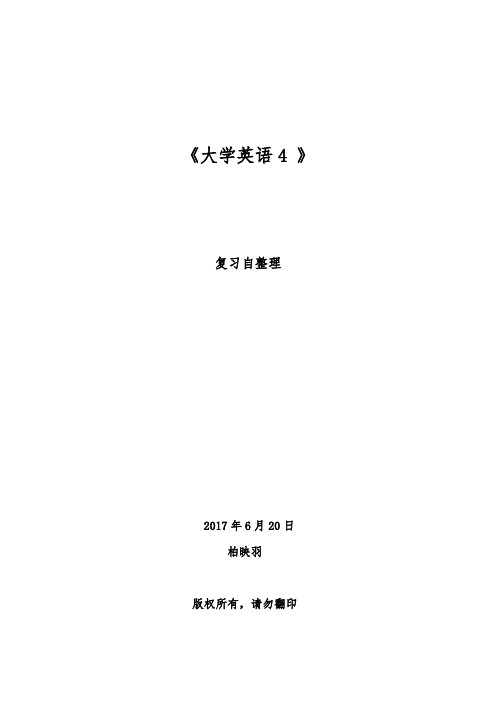
《大学英语4 》复习自整理2017年6月20日柏映羽版权所有,请勿翻印第一单元MAN AND NATURE一.TEXTA(P4-7)课文翻译:人在自然界亚历山大•斯伯金1 人类生活在大自然的王国里。
他们时刻被大自然所包围并与之相互影响。
人类呼吸的空气、喝下的水和摄入的食物,无一不令人类时刻感知到大自然的影响。
我们与大自然血肉相连,离开大自然,我们将无法生存。
2 人类不仅生活在大自然之中,同时也在改变着大自然。
人类把自然资源转变为各种文化、社会历史的财富。
人类降服并控制了电,迫使它为人类社会的利益服务。
人类不仅把各种各样的动植物转移到不同的气候环境下,也改变了他所生活环境的地貌和气候,并使动植物因之而发生转变。
3 随着社会的发展,人类对大自然的直接依赖越来越少,而间接的依赖却越来越多。
我们远古的祖先生活在大自然的威胁及破坏力的恐惧之中,他们常常连基本的生活物资都无法获取。
然而,尽管工具不甚完备,他们却能同心协力,顽强工作,并总是有所收获。
在与人类的相互作用中,大自然也发生了改变。
森林被破坏了,耕地面积增加了。
大自然及其威力被看成是和人类敌对的东西。
譬如,森林被认为是野性的和令人恐惧的,因此人类便想方设法使其面积缩小。
这一切都是打着“文明”的旗号进行的,所谓“文明”,就是指人类在那些地方建立了家园,那些地方的土地得以耕耘,那里的森林已被砍伐。
4 然而,随着岁月的流逝,人类越来越关注的是在何处以及如何得到生产所需的不可替代的自然资源的问题。
科学与人类改变大自然的实践活动已经使人类意识到了工业在改变地球的进程中对地质产生的重大影响。
5 目前,人与自然以及自然与社会整体之间过去存在的动态平衡,已呈现崩溃的迹象。
生物圈中所谓可替代资源的问题变得极为严重。
人类和社会的需求,即便是像淡水一样的物质,也变得越来越难以满足。
清除工业废物的问题也变得日益复杂。
6 现代技术的特征是生产和使用日益丰富的人工合成产品。
人们生产成千上万种人工合成材料。
最新大学英语 读写译第四册课后答案及课文翻译
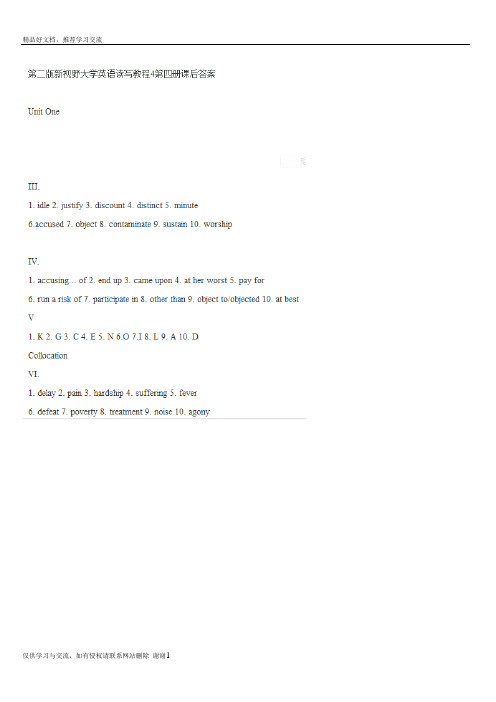
名起诉他了第二版新视野大学英语读写教程第四册课文翻译Unit 1 text A名气之尾艺术家追求成名,如同狗自逐其尾,一旦追到手,除了继续追逐不知还能做些什么。
成功之残酷正在于它常常让那些追逐成功者自寻毁灭。
对一名正努力追求成功并刚刚崭露头角的艺术家,其亲朋常常会建议“正经的饭碗不能丢!”他们的担心不无道理。
追求出人头地,最乐观地说也困难重重,许多人到最后即使不是穷困潦倒,也是几近精神崩溃。
尽管如此,希望赢得追星族追捧和同行赞扬之类的不太纯洁的动机却在激励着他们向前。
享受成功的无上光荣,这种诱惑不是能轻易抵挡的。
成名者之所以成名,大多是因为发挥了自己在歌唱、舞蹈、绘画或写作等方面的特长,并能形成自己的风格。
为了能迅速走红,代理人会极力吹捧他们这种风格。
他们青云直上的过程让人看不清楚。
他们究竟是怎么成功的,大多数人也都说不上来。
尽管如此,艺术家仍然不能闲下来。
若表演者、画家或作家感到无聊,他们的作品就难以继续保持以前的吸引力,也就难以保持公众的注意力。
公众的热情消磨以后,就会去追捧下一个走红的人。
有些艺术家为了不落伍,会对他们的写作、跳舞或唱歌的风格稍加变动,但这将冒极大的失宠的危险。
公众对于他们藉以成名的艺术风格以外的任何形式都将不屑一顾。
知名作家的文风一眼就能看出来,如田纳西?威廉斯的戏剧、欧内斯特?海明威的情节安排、罗伯特?弗罗斯特或 T.S.艾略特的诗歌等。
同样,像莫奈、雷诺阿、达利这样的画家,希区柯克、费里尼、斯皮尔伯格、陈凯歌或张艺谋这样的电影制作人也是如此。
他们鲜明独特的艺术风格标志着与别人不同的艺术形式上的重大变革,这让他们名利双收,但也让他们付出了代价,那就是失去了用其他风格或形式表现自我的自由。
名气这盏聚光灯可比热带丛林还要炙热。
骗局很快会被揭穿,过多的关注带来的压力会让大多数人难以承受。
它让你失去自我。
你必须是公众认可的那个你,而不是真实的你或是可能的你。
艺人,就像政客一样,必须常常说些违心或连自己都不完全相信的话来取悦听众。
英语四级十五选十、阅读。翻译

阅读理解
1. 快速浏览全文,把握文章大意。(特别关注开头两句,及中间段落的 段首句和段尾句,及最后一段总结性的语句) 2. 查看问题,先做细节性问题 【阅读理解问题两类:主旨大意类和细节类。一般主旨大意类题目是第 一道或最后一道。】 细节题的核心:快速定位,看懂定位词所在句及上句和下句。 比较容易定位的词是: A. 不能用中心思想词定位,因为整篇文章都说的是它。 B. 时间、数字、地点、大写字母的单词容易定位。 C. 比较长,难的名词容易定位,好找。 D. 定位词找2-3个就行,多了也记不住。最好是位置不同的两个词。 3. 再做大意主旨类题目。 【此类题目关注文章开头,每段首句、尾句及文章结尾;推论性的题目 中备选项中有些可以根据常识性知识排除】
本题型作题步骤如下:
一,标出15个备选词词性。 二,浏览全文,确定每个空格处应具有 的词性。 三,比较相同词性的备选词,利用上下 文线索,词的褒贬色彩,平行结构,单复数, 时态等标准在几个备选词中选出唯一正确的。 四,完成全文后复查一遍。
阅读理解
两种基本题型: 句子归位 常规选择题
15选10题型的解法
首先,本题型出现在阅读部分,排在两篇常规 阅读文章之前(每篇文章分配9分钟)。所以本题型共 10 道小题最佳完成时间应控制在 7 分钟。每道小题 约40秒。记住,无论一个方法多么高明,如果不能 让你在40秒内解出一道题,这种方法就毫无意义。 其次,同一个单词只用最多一次。破解本题的 核心技巧是通过相同词性备选词排除,达到大幅降 低难度的目的。比如,我们判断出某空应填入名词, 而备选词中只有三个名词,那么我们作题的难度就 从15选1突降至3选1。 最后,利用一分钟通览全文,确定填入答案无 误。
(2020年7月整理)新视野大学英语4 十五选十原文加翻译.doc
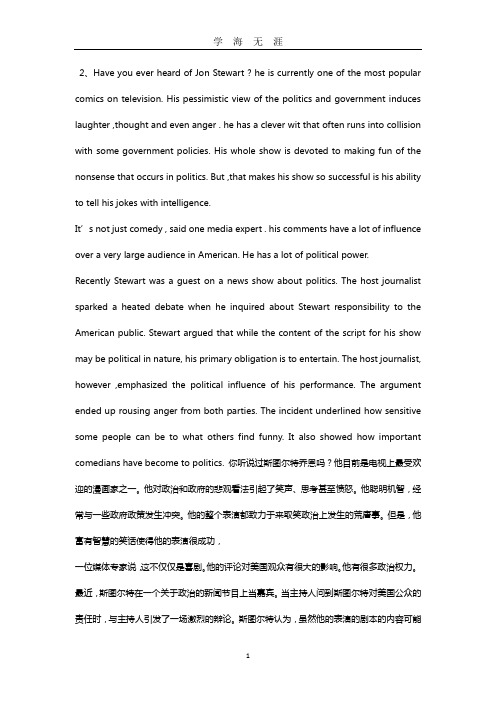
2、Have you ever heard of Jon Stewart ? he is currently one of the most popular comics on television. His pessimistic view of the politics and government induces laughter ,thought and even anger . he has a clever wit that often runs into collision with some government policies. His whole show is devoted to making fun of the nonsense that occurs in politics. But ,that makes his show so successful is his ability to tell his jokes with intelligence.It’s not just comedy , said one media expert . his comment s have a lot of influence over a very large audience in American. He has a lot of political power.Recently Stewart was a guest on a news show about politics. The host journalist sparked a heated debate when he inquired about Stewart responsibility to the American public. Stewart argued that while the content of the script for his show may be political in nature, his primary obligation is to entertain. The host journalist, however ,emphasized the political influence of his performance. The argument ended up rousing anger from both parties. The incident underlined how sensitive some people can be to what others find funny. It also showed how important comedians have become to politics.你听说过斯图尔特乔恩吗?他目前是电视上最受欢迎的漫画家之一。
全新版大学英语4课后练习clozeB(十五选十)及翻译题
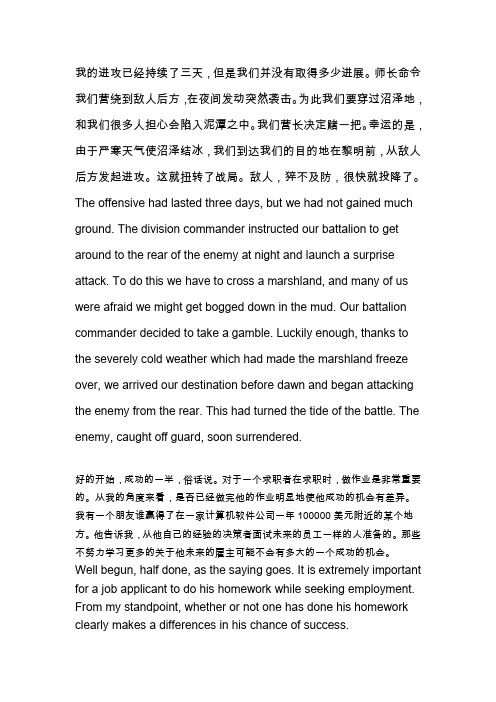
我的进攻已经持续了三天,但是我们并没有取得多少进展。
师长命令我们营绕到敌人后方,在夜间发动突然袭击。
为此我们要穿过沼泽地,和我们很多人担心会陷入泥潭之中。
我们营长决定赌一把。
幸运的是,由于严寒天气使沼泽结冰,我们到达我们的目的地在黎明前,从敌人后方发起进攻。
这就扭转了战局。
敌人,猝不及防,很快就投降了。
The offensive had lasted three days, but we had not gained much ground. The division commander instructed our battalion to get around to the rear of the enemy at night and launch a surprise attack. To do this we have to cross a marshland, and many of us were afraid we might get bogged down in the mud. Our battalion commander decided to take a gamble. Luckily enough, thanks to the severely cold weather which had made the marshland freeze over, we arrived our destination before dawn and began attacking the enemy from the rear. This had turned the tide of the battle. The enemy, caught off guard, soon surrendered.好的开始,成功的一半,俗话说。
对于一个求职者在求职时,做作业是非常重要的。
从我的角度来看,是否已经做完他的作业明显地使他成功的机会有差异。
英语四级十五选十 课后练习答案详解版
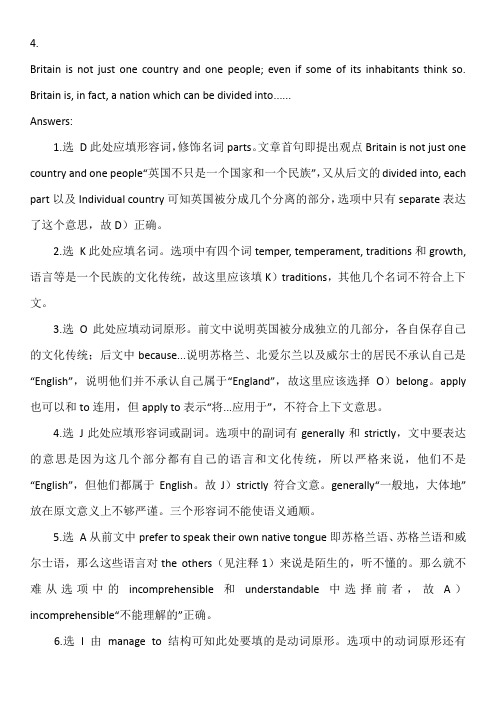
4.Britain is not just one country and one people; even if some of its inhabitants think so. Britain is, in fact, a nation which can be divided into......Answers:1.选D此处应填形容词,修饰名词parts。
文章首句即提出观点Britain is not just one country and one people“英国不只是一个国家和一个民族”,又从后文的divided into, each part以及Individual country可知英国被分成几个分离的部分,选项中只有separate表达了这个意思,故D)正确。
2.选K此处应填名词。
选项中有四个词temper, temperament, traditions和growth,语言等是一个民族的文化传统,故这里应该填K)traditions,其他几个名词不符合上下文。
3.选O此处应填动词原形。
前文中说明英国被分成独立的几部分,各自保存自己的文化传统;后文中because...说明苏格兰、北爱尔兰以及威尔士的居民不承认自己是“English”,说明他们并不承认自己属于“England”,故这里应该选择O)belong。
apply 也可以和to连用,但apply to表示“将...应用于”,不符合上下文意思。
4.选J此处应填形容词或副词。
选项中的副词有generally和strictly,文中要表达的意思是因为这几个部分都有自己的语言和文化传统,所以严格来说,他们不是“English”,但他们都属于English。
故J)strictly符合文意。
generally“一般地,大体地”放在原文意义上不够严谨。
三个形容词不能使语义通顺。
5.选A从前文中prefer to speak their own native tongue即苏格兰语、苏格兰语和威尔士语,那么这些语言对the others(见注释1)来说是陌生的,听不懂的。
新视野大学英语读写教程第4册翻译和十五选十参考答案

第一单元:1、object2、protes ts3、worshipp ing4、fancy5、origin ally6、altitu d e7、wake8、cruelty9、desper ate 10、bankru p t1. The plantdoes not grow well in soilsotherthan the one in whichit has been develo ped.2. Resear ch findin gs show that we spendabouttwo hoursdreami ng everynight, no matter what we may have done during the day.3. Some people tend to justif y theirfailur e by blamin g others for not trying theirbest.4. We remain tree to our commit ment: Whatev er we promis ed to do; we woulddo it.5. Even Beetho ven's father discou ntedthe possib ility that his son wouldone day become the greate st musici an in the world. The same is true of Edison, who seemed to his teache r to be quitedull.6. They were accuse d by author ities of threat ening the statesecuri ty.第三单元:1、notify2、compen satio n3、pensio n4、neglec ted5、receip t6、provis ion7、occur8、misund ersta nd9、ridicu lous 10、recovery1. Sevenor eightoffici als are report ed to have takenbribes and the mayorhas decide d to look into the affair in person.2. Theseworker s regret yieldi ng to the manage ment's advice and goingback to work. Now they are againfacedwith the threat of losing theirjobs.3. Y ou only need to fill out a form to get your member ship, whichentitl es you to a discou nt on goods.4. Theircar brokedown halfwa y for no reason. As a result they arrive d threehourslaterthan they had planne d.5. The offici al got involv ed in a scanda l and was forced to resign weekslater.6. The man living on welfar e beganto buildup his own market, one step at a time and his busine ss is thrivi ng.第五单元:1、therap y2、solitu d e3、interr up tio n4、belong s5、share6、intera ction7、commod ity8、reflec t9、stretc h 10、ration al1. This little man is not so innoce nt as he appear s.2. There's nothin g I can do aboutthe proble m, so you mightas well turn to Profes sor Wang for help.3. Both sidesspeakhighly of the fruits in theircooper ation in differ ent areas, and hope that the cooper ation can be furthe red.4. On the one hand, an imageof beingcloseto the people can get a new policy more easily accept ed. On the otherhand, it will "encour age people to speaktheirmindsandcome up with constr uctiv e sugges tions".5. His senseof loneli nessrose and fell and he someti mes wouldtalk at length to himsel f and his pets and the televi sion.6. Afterall, moneyis not everyt hing. The riches t people are not necess arily the happie st.第六单元:1、negati vely2、consen t3、bribe4、exchan g e5、invest igati on6、scratc h7、accoun ting 8、shield ed9、unveil ed 10、exploi ted1. Suppos e you foundout that your collea gue takesbribes, wouldyou just ignore it?2. We've givenup on him becaus e he is so stubbo rn. It is pointl ess to arguewith him.3. He hit upon a good method to speedup the progre ss of the experi ment,but opinio ns differ ed amongmember s of the groupon it.4. TodayI'm able to square my profes sionwith my intere st, whichI wasn't able to do before.5. The abilit y to visual ly distin guish betwee n red and greenis essent ial to becomi ng a driver.6. The team consis ted of sevenpeople who met on a regula r basisto sharetheirinform ation with each other.第八单元:1、suspec t2、reveal s3、underv alued4、discri minat es5、prejud iced6、judgmen ts7、remain8、mainta in 9、undere stima te 10、repres ent1. 1 don’tmindhisstayin g out so late as long as he behave s himsel f.2. 1 prefer his plan to others in that I thinkno plan is more practi cal than his.3. They brokeoff busine ss relati ons with that compan y as it suffer ed huge losses in the last fiscal year and went bankru pt.4. Now that you don't like him, why did you invite him to your birthd ay partyin the firstplace?5. Though we knew our chance s to win were slim, we were more or less depres sed when we lost in the game.6. Perhap s this was the pricethat has to be paid for progre ss-who knows?。
- 1、下载文档前请自行甄别文档内容的完整性,平台不提供额外的编辑、内容补充、找答案等附加服务。
- 2、"仅部分预览"的文档,不可在线预览部分如存在完整性等问题,可反馈申请退款(可完整预览的文档不适用该条件!)。
- 3、如文档侵犯您的权益,请联系客服反馈,我们会尽快为您处理(人工客服工作时间:9:00-18:30)。
TextIs it ever proper for a medical doctor to lie to his patient? Should he tell apatient he is dying? These questions seem simple enough, but it is not so simpleto give a satisfactory answer to them. Now a new light is shed on them.TO LIE OR NOT TOLIE—THE DOCTOR'S DILEMMASissela BokShould doctors ever lie to benefit their patients -- to speed recovery or toconceal the approach of death? In medicine as in law, government, and other lines of work, the requirements of honesty often seem dwarfed by greater needs:the need to shelter from brutal news or to uphold a promise of secrecy; to expose corruption or to promote the public interest.What should doctors say, for example, to a 46-year-old man coming in for aroutine physical checkup just before going on vacation with his family who,though he feels in perfect health, is found to have a form of cancer that will causehim to die within six months? Is it best to tell him the truth? If he asks, should thedoctors deny that he is ill, or minimize the gravity of the illness? Should they atleast conceal the truth until after the family vacation?Doctors confront such choices often and urgently. At times, they seeimportant reasons to lie for the patient's own sake; in their eyes, such lies differ sharply from self-serving ones.Studies show that most doctors sincerely believe that the seriously ill do notwant to know the truth about their condition, and that informing them risksdestroying their hope, so that they may recover more slowly, or deteriorate faster,perhaps even commit suicide. As one physician wrote: "Ours is a profession which traditionally has been guided by a precept that transcends the virtue of uttering the truth for truth's sake, and that is 'as far as possible do no harm.'"Armed with such a precept, a number of doctors may slip into deceptivepractices that they assume will "do no harm" and may well help their patients. They may prescribe innumerable placebos, sound more encouraging than the facts warrant, and distort grave news, especially to the incurably ill and the dying.But the illusory nature of the benefits such deception is meant to produce isnow coming to be documented. Studies show that, contrary to the belief of manyphysicians, an overwhelming majority of patients do want to be told the truth,even about grave illness, and feel betrayed when they learn that they have beenmisled. We are also learning that truthful information, humanely conveyed, helpspatients cope with illness: helps them tolerate pain better, need less medicine, and even recover faster after surgery.Not only do lies not provide the "help" hoped for by advocates of benevolent deception; they invade the autonomy of patients and render them unable to make informed choices concerning their own health, including the choice of whether to be patient in the first place. We are becoming increasingly aware of all that can befall patients in the course of their illness when information is denied or distorted.Dying patients especially -- who are easies to mislead and most often kept in the dark -- can then not make decisions about the end of life: about whether or not they should enter a hospital, or have surgery; about where and with whom they should spend their remaining time; about how they should bring their affairs to a close and take leave.Lies also do harm to those who tell them: harm to their integrity and, in the long run, to their credibility. Lies hurt their colleagues as well. The suspicion of deceit undercuts the work of the many doctors who are scrupulously hones with their patients; it contributes to the spiral of lawsuits and of "defensive medicine," and thus it injures, in turn, the entire medical profession.Sharp conflicts are now arising. Patients are learning to press for answers. Patients' bills of rights require that they be informed about their condition and about alternatives for treatment. Many doctors go to great lengths to provide such information. Yet even in hospitals with the most eloquent bill of rights, believers in benevolent deception continue their age-old practices. Colleagues may disapprove but refrain from objecting. Nurses may bitterly resent having to take part, day after day, in deceiving patients, but feel powerless to take a stand.There is urgent need to debate this issue openly. Not only in medicine, but in other professions as well, practitioners may find themselves repeatedly in difficulty where serious consequences seem avoidable only through deception. Yet the public has every reason to be wary of professional deception, for such practices are peculiarly likely to become deeply rooted, to spread, and to erode trust. Neither in medicine, nor in law, government, or the social sciences can there be comfort in the old saying, "What you don't know can't hurt you."。
